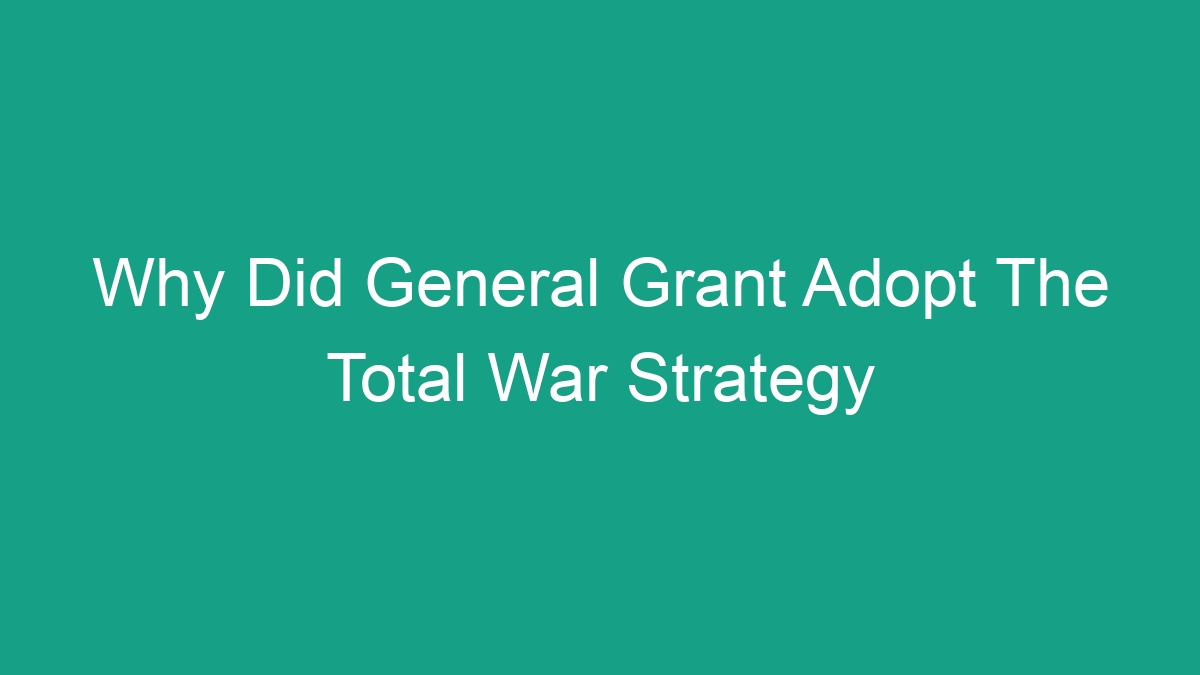
When discussing the American Civil War, one cannot overlook the significant role played by General Ulysses S. Grant. His adoption of the total war strategy was a pivotal move that ultimately led to the Union’s victory. But what exactly prompted General Grant to adopt this approach? Let’s delve into the reasons behind his decision and the impact it had on the outcome of the war.
The Context of the Civil War
To understand why General Grant adopted the total war strategy, it is essential to consider the context of the Civil War. The conflict between the Union and the Confederacy was characterized by deep-seated divisions that extended beyond the battlefield. The Southern states were fighting to preserve their way of life, including the institution of slavery, while the Northern states sought to uphold the unity of the nation and abolish slavery.
The early years of the war saw conventional tactics being employed by both sides, with an emphasis on capturing territory and engaging in traditional military maneuvers. However, as the war dragged on and casualties mounted, a new approach was necessary to bring about a decisive victory.
The Evolution of Grant’s Strategy
General Grant’s initial tactics mirrored those of his predecessors, but he soon recognized the need for a more aggressive and all-encompassing approach. Grant’s experiences at the Battle of Shiloh in April 1862 proved to be a turning point in his military thinking. The fierce and costly engagement made him realize that a more ruthless strategy was required to overcome the Confederacy.
Grant’s appointment as commander of the Union armies in 1864 provided him with the authority to implement his vision of total war. Under this strategy, he sought to not only defeat the Confederate forces in battle but to also dismantle their capacity to wage war by targeting the economic, social, and infrastructure assets that supported the Southern war effort.
The Reasons Behind Grant’s Adoption of Total War
Several factors influenced General Grant’s decision to adopt the total war strategy:
- Stalemate: The war had reached a stalemate, with neither side able to secure a decisive advantage. Traditional military tactics had proven inadequate in breaking the deadlock, leading Grant to explore alternative approaches.
- Escalating Casualties: The mounting casualties on both sides highlighted the need for a more aggressive strategy that could bring the war to a swifter conclusion, thus minimizing further loss of life.
- Resource Depletion: Grant recognized that the Confederacy’s resources were limited, and by targeting its economic and logistical infrastructure, he could erode its ability to sustain the war effort.
- Political Pressure: The Lincoln administration and Union leadership were eager for a decisive victory, and Grant understood that a bold and unrelenting strategy would be necessary to achieve this goal.
The Impact of Total War
General Grant’s adoption of the total war strategy had far-reaching consequences:
- Devastation of Southern Resources: Union forces under Grant’s command systematically targeted the Confederacy’s agricultural, industrial, and transportation infrastructure, inflicting severe damage and depriving the Southern states of vital resources.
- Psychological Impact: The relentless campaign waged by Grant and his forces created a sense of despair and demoralization among the Confederate population, ultimately undermining their willingness to continue the fight.
- Strategic Brilliance: Grant’s strategic vision and audacity in pursuing total war demonstrated his ability to think beyond traditional military tactics, ultimately contributing to the Union’s victory.
FAQ
What were the key principles of total war?
Total war encompassed a range of strategies aimed at weakening the enemy’s resolve and capacity to wage war. These included targeting civilian infrastructure, disrupting supply lines, and undermining the economic foundations of the opposing side.
Did General Grant face any opposition to his adoption of total war?
While some within the Union leadership were initially wary of the total war strategy, Grant’s successes on the battlefield and his unwavering commitment to achieving victory gradually swayed opinion in his favor.
How did total war impact the outcome of the Civil War?
Total war played a pivotal role in tipping the scales in favor of the Union. By debilitating the Confederacy’s ability to sustain the war effort, General Grant’s adoption of the strategy hastened the collapse of the Southern states and ultimately contributed to the Union’s triumph.




